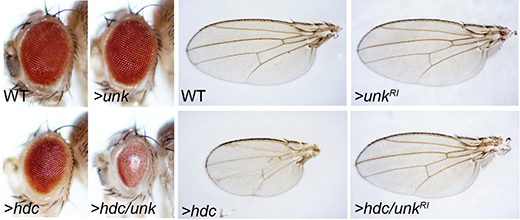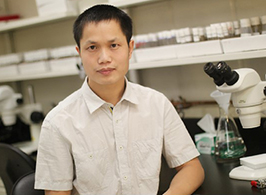Study identifies two proteins that suppress tumor growth in fruit flies, suggests similar effect on human cancers
Thursday, Jan. 31, 2019

The protein "Headcase," or Hdc, functions together with the protein "Unkempt," or Unk, to regulate tissue growth in fruit flies. | Download this photo.
MANHATTAN — The concept sounds simple, but understanding the process has been elusive: Cut off the nutrient supply to suppress the growth of tumors.
Now researchers in the College of Veterinary Medicine at Kansas State University are unveiling promising results for this concept by studying the behaviors of specific proteins in fruit flies. The proteins have known counterparts in humans.
"In our latest study, we identified 'Headcase,' or Hdc, and 'Unkempt,' or Unk, as two nutrient-restriction-specific tumor suppressor proteins that form a complex that acts to restrict cell-cycle progression and tissue growth in response to nutrient stress in Drosophilaorfruit flies," said Jianzhong Yu, assistant professor and cancer biologist in the college's anatomy and physiology department.
Yu is collaborating with Naren Li, postdoctoral fellow in anatomy and physiology; Yulan Xiong, assistant professor of anatomy and physiology; and QinfangLiu, doctoral student in physiology. The four of them recently published an article on their latest research, "Headcase and Unkempt Regulate Tissue Growth and Cell Cycle Progression in Response to Nutrient Restriction," in the journal Cell Reports.
Their study was supported in part by a grant from the National Institutes of Health's Kansas INBRE program, a startup fund and SUCCESS-FYI Intramural Grant from the College of Veterinary Medicine. The work is also supported by the Johnson Cancer Research Center at Kansas State University.
"Given the role of the human counterparts of these proteins, our results suggest that Hdc and Unk may function as tumor suppressors in mammals," Yu said. "Although the human ortholog of Unk has not been studied in the context of cell proliferation, we showed that both Hdc and Unk are able to inhibit tissue growth in vivo in the Drosophila model. Thus, it is worthwhile in the future to investigate the growth control function of these two proteins, especially in regard to the formation of cancer tumors."

